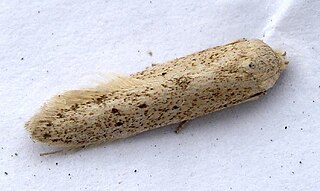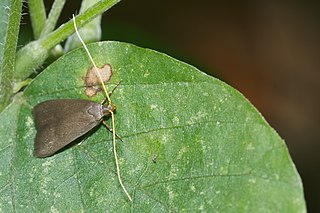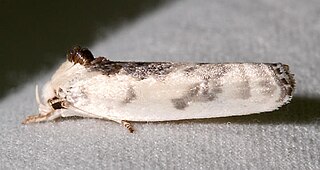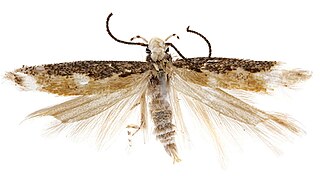
The Blastobasidae are a family of moths in the superfamily Gelechioidea. Its species can be found almost anywhere in the world, though in some places they are not native but introduced by humans. In some arrangements, these moths are included in the case-bearer family (Coleophoridae) as subfamily Blastobasinae. The Symmocidae are sometimes included in the Blastobasidae as subfamily or tribe.

The Archipini are a tribe of tortrix moths. Since many genera of these are not yet assigned to tribes, the genus list presented here is provisional.

Anarsia is a genus of moths in the family Gelechiidae.

Aristotelia is a genus of moths in the family Gelechiidae. Well-known species are food plant specialists, and diverse hosts are used – Salicaceae, Solanaceae, Rosaceae, Fagaceae, Fabaceae, Asteraceae.

Dichomeris is a genus of moths in the family Gelechiidae erected by Jacob Hübner in 1818.

Thiotricha is a genus of moths in the family Gelechiidae, subfamily Thiotrichinae.
Auximobasis is a genus of the gelechioid moth family Blastobasidae. It is sometimes included in Blastobasis.

Blastobasis is the type genus of the gelechioid moth family Blastobasidae; in some arrangements these are placed in the case-bearer family (Coleophoridae) as a subfamily. Within the Blastobasidae, the subfamily Blastobasinae has been established to distinguish the Blastobasis lineage from the group around Holcocera, but the delimitation is not yet well-resolved.

The Lecithocerinae are a subfamily of small moths in the family Lecithoceridae. They are found worldwide, but most species occur in South Asia. The subfamily is characterized by the male genitalia with a bridge-like structure connecting the tegumen and the valva, and the uncus almost always is vestigial with two lobes at the dorsal base, only exceptionally united into a broad plate, but never as a thorn or spine.

Lecithocera is a genus of moths in the lecithocerid subfamily Lecithocerinae. The genus was erected by Gottlieb August Wilhelm Herrich-Schäffer in 1853.

Antaeotricha is a genus of moths. It is the largest genus in the subfamily Stenomatinae, numbering over 400 species in the Western Hemisphere.

Acrocercops is a genus of moths in the family Gracillariidae.
Auximobasis administra is a moth in the family Blastobasidae. It was described by Edward Meyrick in 1922. It is found in Peru and Colombia.
Auximobasis agrestis is a moth in the family Blastobasidae. It was described by Edward Meyrick in 1922. It is found in Pará, Brazil.
Auximobasis angusta is a moth in the family Blastobasidae. It was described by Edward Meyrick in 1922. It is found in Colombia and Ecuador.
Auximobasis flavida is a moth in the family Blastobasidae. It was described by Edward Meyrick in 1922. It is found in Peru and Pará, Brazil.
Auximobasis prolixa is a moth in the family Blastobasidae. It was described by Edward Meyrick in 1922. It is found in Peru.
Auximobasis incretata is a moth in the family Blastobasidae. It was described by Edward Meyrick in 1931. It is found in Peru.
Auximobasis invigorata is a moth in the family Blastobasidae. It was described by Edward Meyrick in 1932. It is found on the Virgin Islands.

Gelechiinae is a subfamily of moths in the family Gelechiidae. It was described by Henry Tibbats Stainton in 1854.











